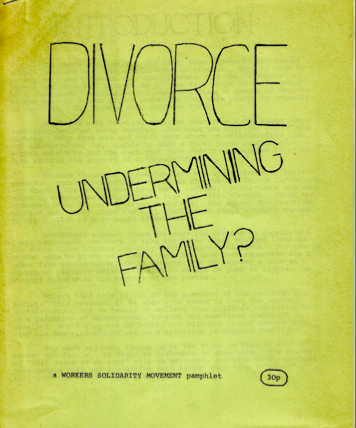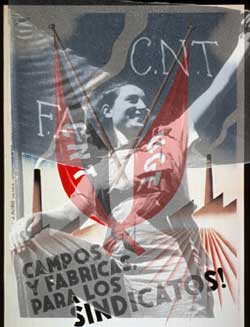Workers Solidarity Movement position paper on Abortion Rights as amended at November 2010 National Conference
a Workers Solidarity Movement policy statement
Abortion Rights
1. Why we believe in a "woman's right to choose"
The WSM is entirely opposed to women's oppression. Women's biology, pregnancy and child-bearing has copper-fastened our inferior position in capitalist society. This has been extended so that we are also stuck with child rearing and child-minding within the family. Therefore women's access to work, education, leisure and any chance of self-advancement has been strictly limited. This is especially true for working class women.
Women have always tried to control their own fertility. Anti-abortion laws have resulted in back-street abortions and induced miscarriages. World-wide, one woman dies from a back-street abortion every three minutes. Winning full control over our own fertility is an essential step towards ending womens' oppression. The technology has been developed under capitalism to make this both safe and possible. Women must have the right to use this technology to decide if and when to have children.
We support a woman's access to full, free and safe contraception. If she finds herself pregnant but does not wish to have a child then she should have access to free, safe abortion on request.
2. What do we mean by a woman's right to choose
We believe in real options and real choices for women. A woman who wants to have a child shouldn't have to spend the rest of her life looking after it. This is why we favour the option of full child-care provision paid for by the state, maternity leave and flexi-time for working, public creche facilities and restaurants. The present role of many women as full-time unpaid childminders within the family must be ended.
A woman who finds herself pregnant and does not wish to remain so should have a right to free, safe abortion on demand. This is not an abstract political slogan, we don't go around shouting "free abortion on demand" in the belief that it can only be gained in the context of a socialist revolution. We believe that it is merely one of the basic first steps in freeing women from the constraints placed on us by capitalism.
Our argument for abortion rights rests on womens' right to control our own fertility. The quality of a woman's life can never be made equal to that of an unborn foetus. The foetus is totally dependent on the mother it cannot be said to have an independent existence. To give it such rights (as per the Irish constitution) reduces women to the status of breeding machines or walking wombs. Just as an acorn can become an oak tree, a foetus can become a human baby. But a foetus is no more a baby than an acorn is an oak tree.
However, politically, there is little point in entering debates on "when does life begin?" or viability of the foetus. Our arguments must must focus on a woman's right to control her own body.
3. The current legal situation
In 1861 Abortion was made a criminal offence in Ireland. This was still the case in 1983 when the anti-choice lobby got the government to hold a referendum which amended the Constitution to give equal rights to the "unborn". This is the 8th Amendment.
In 1992 the High Court granted an injunction preventing a 14 year old, pregnant as a result of rape, from traveling to Britain for an abortion (this was the X-case). The WSM was centrally involved in organising protests of up to 10,000, which led to the injunction being withdrawn and a major shift in public attitudes towards abortion.
In the same year two referendums passed, which amended the Constitution to protect the right to travel and to have information about abortion services abroad. A third option, to exclude suicide as a life-threatening risk which would legally justify abortion, was rejected.
In 2002 voters rejected another constitutional amendment to allow abortion where a woman’s life is at risk from pregnancy, but not suicide, by 50.42% to 49.58%.
No legislation has ever been enacted to allow for the very limited grounds established by the X-case. To legalise abortion in any other circumstances first requires a referendum to overturn the 8th Amendment.
4. The situation today and the strategy of the WSM
(a) The anti-choice and religious fundamentalist groups are losing support, all major opinion polls show a majority of voters prepared to permit abortion in at least some circumstances.
(b) The major political parties want to ignore the issue, using the availability of abortion abroad as a ‘safety valve’.
(c) The number of people active in the abortion rights movement will be small until the possibility of a referendum to repeal the 8th Amendment becomes apparent. (d) We favour uniting all who will work for repeal - with the proviso that the explicitly pro-choice position be represented, along with more limited views, on all platforms.
(e) The building of a visible pro-choice movement is a vital part of the ‘battle of ideas’ that will see eventual legalisation.
(f) The movement should be primarily based on the needs of working class women: for free, safe & legal abortion provision as part of the health service.
(g) In Northern Ireland we call for the enacting of the British 1967 Abortion Act.
(h) Real choice means being able to end a pregnancy or have children without suffering major economic or social costs. We call for:
- The provision of a guaranteed minimum income, housing and childcare facilities for all women who continue our pregnancies and keep our children.
- A supportive attitude to all women who decide to opt for adoption, and recognition of the rights of women and children in this position.
- Provision of non-directive pregnancy counselling to all who require it.
(i) The struggle for abortion rights is part of the struggle for more liberty, men as well as women should be involved.
5. Choice Ireland
(a) We have been an active part of the pro-choice movement since our foundation. Recently we helped to form Choice Ireland.
(b) We will argue within Choice Ireland for it for it to continue being an agitational and outspoken advocate of a woman’s right to choose.
Amended at November 2010 Conference





 This pamphlet was produced by the Workers Solidarity Movement in the weeks before the 1986 referendum on whether or not to remove...
This pamphlet was produced by the Workers Solidarity Movement in the weeks before the 1986 referendum on whether or not to remove...


